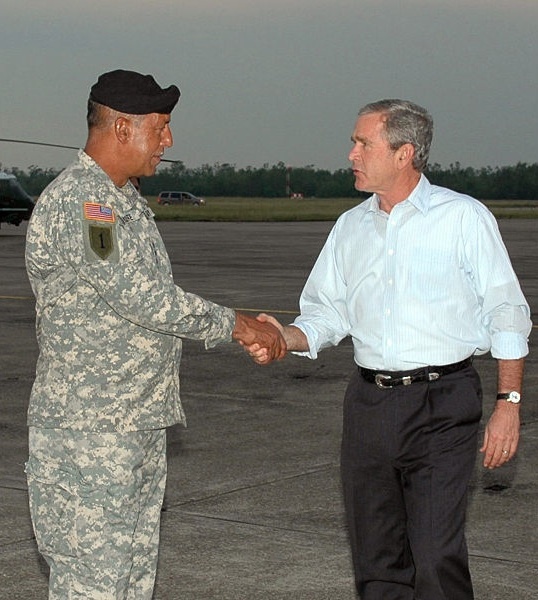In Louisiana, a former Army commander goes to war against Big Oil

With the trial of BP for its 2010 Gulf of Mexico oil disaster still underway, and with controversy raging over a lawsuit filed against oil companies for eroding Louisiana's coast, the industry is facing growing scrutiny for its impact on the region.
Among those speaking out in surprisingly strong terms about the need to rein in out-of-control oil companies is a man who might seem an unlikely messenger for environmental justice: retired Army Lt. Gen. Russel Honoré, a Point Coupee Parish native and Republican since the Reagan administration who gained national fame for serving as commander of Joint Task Force Katrina following the 2005 disaster. He now works to promote disaster preparedness.
Earlier this month, Honoré gave a talk before two dozen civic and environmental leaders who gathered at a New Orleans restaurant to talk about how to hold the industry responsible for the damage it's done.
Mark Moseley of The Lens, a public-interest news website, reports that Honoré's talk was "about the nuts and bolts of building a successful political movement" by bringing disparate groups and individuals together to work toward a common goal:
Like a general plotting battlefront logistics, he pinpointed the enemy's points of vulnerability and used military metaphors to illustrate strategies that could lead to victory.
Honoré gave a related speech in September at Rising Tide, a conference on the future of New Orleans held at Xavier University. His delivery was folksy, but his message was radical: an out-of-control oil industry was ruining Louisiana's air, water, and land, and it must be stopped.
He encouraged participants to return home and recruit others to the cause, but he warned that they would likely be ignored because of cultural deference to the industry:
They'll say, "Why you worry about that? You know Louisiana runs on the oil and gas business. We can't do without the oil and gas business. Don't you know how much they do for the state of Louisiana?" Well, if they do so much, why are we the poorest damn state in America? Why everybody down here not driving a brand new GMC Silverado Bayou Edition? Why all our kids don't get to go to $15,000-a-year private schools? Why everybody down here don't have their own private jet, if we're doing that well?
Honoré went on to talk about the inadequacy of current laws and regulations to protect people and the environment from the industry's irresponsibility, sharing a disturbing story he heard from a man helping him with his baggage at the airport whose friend was decapitated by an abandoned oil well while boating on the Gulf of Mexico. There are over 28,000 wells in the Gulf that have been abandoned by oil and gas companies, some dating back as far as 1948. Many are leaking oil.
Given the severity and urgency of the problem, Honoré called for what sounds like civil disobedience:
Ladies and gentlemen, the legislature in the state of Louisiana is going to have to deal with this. Because of our form of government and constitution the way it's written, we can't create a Proposition 200, for instance, that says all the wells must be capped, all areas must be mitigated by the oil companies. In order for us to create a proposition like this, we'd have to take it through the legislature of Louisiana. And they're not going to pass it. So we've got a couple choices. We can do what? Create some change. Or we can go down there and make it very miserable for them. And I'm afraid that we're going to have to do the latter. We're going to have to make it very miserable for them to be able to operate by continuing to pass the rules the way they are now. This is our time. This is our battle.
You can watch his full Rising Tide talk here:
(Rising Tide 8 - Keynote - Lt. General Russel Honore from Jason Berry on Vimeo.)
The political difficulty of taking on the oil industry in Louisiana was underscored recently when Gov. Bobby Jindal (R) replaced the president and vice president of the Southeast Louisiana Flood Protection Authority-East after the blue-ribbon committee of scientists and coastal experts -- formed after Katrina to better resist political pressure -- filed a lawsuit in July against 97 oil, gas and pipeline companies. The suit claims the damage to the wetlands has reduced levees' ability to protect communities and violates state and federal permit requirements, and it seeks to force the companies to repair or pay to repair the damage.
Louisiana loses a chunk of wetlands the size of a football field every hour -- 1,900 square miles since the 1930s, an area larger than the entire state of Rhode Island. The oil and gas industry is estimated to bear responsibility for up to 60 percent of that loss, much of it caused by companies carving canals through wetlands and failing to fill them back in, creating permanent conduits for saltwater that in turn kills off vegetation anchoring the land in place.
And what industry happens to be the biggest contributor to Jindal's campaign, according to the National Institute on Money in State Politics?
The oil and gas industry.
Tags
Sue Sturgis
Sue is the former editorial director of Facing South and the Institute for Southern Studies.
